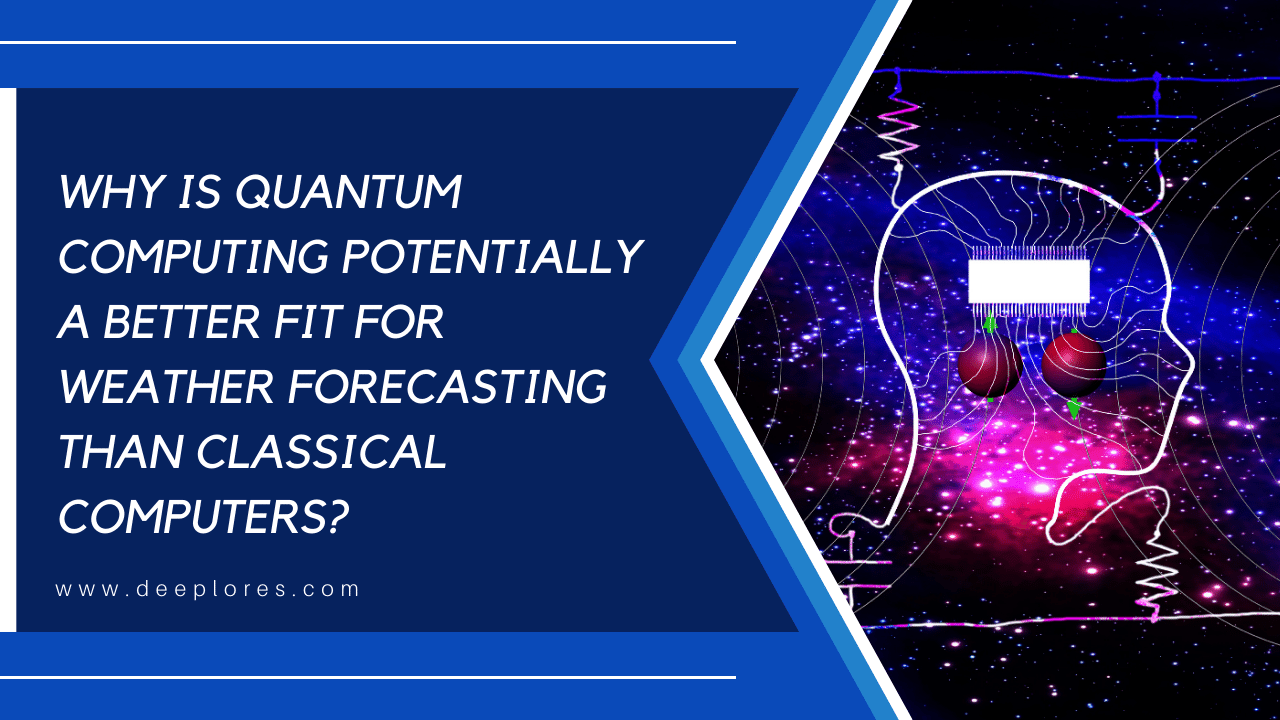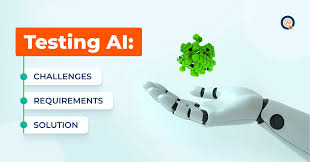Why is Quantum Computing Potentially a Better Fit for Weather Forecasting Than Classical Computers?
As we stand on the brink of a new era in technological advancement, one field that is poised to reap substantial benefits is weather forecasting. In the quest for more accurate, timely, and detailed predictions, scientists and researchers are turning their attention to the burgeoning realm of quantum computing. Quantum computing’s extraordinary computational power and unique capabilities hold the potential to revolutionize the accuracy and efficiency of weather forecasting, transcending the limitations of classical computers. In this article, we delve into why is quantum computing potentially a better fit for weather forecasting than classical computers?
Quantum Mechanics and Weather Prediction
The classical computers that have long served as the backbone of weather forecasting are increasingly grappling with the immense complexity of atmospheric phenomena. This is where quantum mechanics enters the scene. Quantum mechanics, the fundamental theory that governs the behavior of matter and energy at the smallest scales, brings with it a distinct advantage: the ability to process and analyze vast amounts of data and variables simultaneously. Classical computers rely on binary bits (0s and 1s), whereas quantum computers leverage quantum bits or qubits that can exist in multiple states at once. This concept of superposition enables quantum computers to perform complex calculations in parallel, offering a significant edge over classical computers when it comes to handling the intricate intricacies of weather patterns.
Quantum Algorithms: Pioneering Precision
One of the key elements that makes quantum computing an exciting prospect for weather forecasting is the development of quantum algorithms tailored to the task. These algorithms exploit quantum phenomena to solve complex problems with unparalleled efficiency. Take, for instance, the problem of data assimilation, where real-time observations are combined with model predictions to refine forecasts. Quantum algorithms can rapidly analyze and process vast volumes of observational data, leading to more accurate and timely predictions. These algorithms can also tackle optimization problems inherent in weather modeling, ensuring that forecasts are not only accurate but also produced in a fraction of the time it would take classical computers.
Quantum Simulations: Unlocking Unprecedented Insights
Simulation is a cornerstone of weather forecasting, allowing scientists to model and understand the behavior of the atmosphere under various conditions. Quantum simulations, powered by quantum computers, take this capability to a whole new level. By simulating quantum systems that mimic atmospheric processes, quantum computers can provide a deeper understanding of the intricate interplay between variables. This enables researchers to explore scenarios that were previously computationally infeasible, uncovering insights that can enhance the accuracy of forecasts. For example, quantum simulations could offer insights into the behavior of turbulent flows, a phenomenon that profoundly impacts weather patterns but remains notoriously difficult to predict accurately.
Precision and Parallelism: Quantum’s Meteorological Edge
When it comes to weather forecasting, precision and speed are of the essence. Quantum computing shines on both fronts. Quantum computers possess an inherent ability to perform calculations with remarkable precision due to their quantum nature. This precision is particularly vital in weather forecasting, where small errors in initial conditions can lead to drastically different outcomes. Additionally, quantum parallelism grants quantum computers an unmatched advantage in handling the immense parallel computations required for weather modeling. Quantum computers can simultaneously process a multitude of variables and scenarios, providing meteorologists with a comprehensive and nuanced understanding of evolving weather patterns.
Quantum Machine Learning: A Meteorological Revolution
Machine learning has emerged as a game-changer in various scientific domains, and weather forecasting is no exception. Quantum machine learning, an amalgamation of quantum computing and machine learning, holds the promise of catapulting meteorological predictions to new heights. Quantum computers can accelerate machine learning tasks, enabling more intricate and accurate models. By harnessing quantum machine learning, meteorologists can decipher complex atmospheric patterns, leading to improved forecasts for phenomena like hurricanes, droughts, and heatwaves.
Real-World Impact and Challenges
The potential of quantum computing in weather forecasting is not confined to theoretical realms. Research and experimentation are already underway, showcasing promising results. For instance, researchers at leading institutions are utilizing quantum computing to optimize data assimilation techniques, leading to more precise predictions. Moreover, quantum-enhanced simulations are shedding light on the behavior of atmospheric aerosols, aiding climate modeling. These examples underscore the tangible impact that quantum computing can have on weather prediction.
However, challenges persist on the path to seamless integration. Quantum computers are still in their infancy, and building robust, error-resistant quantum systems remains a formidable task. Moreover, developing and fine-tuning quantum algorithms tailored to meteorological applications requires concerted efforts from both quantum and meteorological experts. Overcoming these challenges necessitates interdisciplinary collaboration and sustained research endeavors.
Frequently Asked Questions
1. How can quantum computing improve weather forecasting?
Quantum computing’s ability to process vast amounts of data simultaneously, its precision, and accelerated simulations make it a game-changer for accurate and timely weather predictions.
2. Are there quantum algorithms designed specifically for weather modeling?
Yes, researchers are developing quantum algorithms that optimize data assimilation, enhance weather modeling, and tackle optimization challenges inherent in meteorology.
3. Can quantum simulations provide more accurate weather forecasts?
Absolutely. Quantum simulations enable scientists to model atmospheric behavior with unprecedented accuracy, leading to deeper insights and more reliable predictions.
4. What role does quantum machine learning play in meteorology?
Quantum machine learning accelerates the development of intricate models, helping meteorologists decipher complex patterns and phenomena such as hurricanes and droughts.
5. Are there real-world examples of quantum-enhanced weather simulations?
Yes, researchers are already using quantum computing to optimize data assimilation techniques and gain insights into atmospheric aerosols, showcasing the practical impact of quantum-enhanced simulations.
6. How do classical and quantum computers differ in weather prediction?
Classical computers rely on binary bits for calculations, while quantum computers leverage qubits that can exist in multiple states simultaneously, enabling quantum computers to handle complex parallel computations.
7. Can quantum technology revolutionize meteorological research?
Absolutely. Quantum technology has the potential to revolutionize meteorological research by providing unprecedented computational power and precision, leading to more accurate and timely predictions.
8. What challenges can quantum computing solve in meteorology?
Quantum computing can address challenges related to processing vast amounts of data, optimizing complex models, and simulating intricate atmospheric processes more accurately.
9. How does quantum computing speed up weather data analysis?
Quantum parallelism allows quantum computers to process multiple variables and scenarios simultaneously, significantly speeding up the analysis of complex weather data.
10. Are there quantum algorithms for accurate hurricane predictions?
Quantum algorithms can enhance hurricane predictions by enabling more precise data assimilation, simulating complex atmospheric behaviors, and accelerating machine learning techniques.
Also Read: Which Element of Accenture’s Applied Quantum Computing Strategy Directly Delivers Value to Clients?
Conclusion: A Quantum Horizon of Weather Forecasting
As the sun sets on the era of classical computing, a new dawn rises with the promise of quantum computing. The intricate dance of particles at the quantum level is poised to choreograph a symphony of precision and insight in the field of weather forecasting. With quantum algorithms, simulations, and machine learning techniques, meteorology stands on the cusp of a transformative era—one where the complexities of the atmosphere are unraveled with unprecedented accuracy.
As we wrap up, we trust that this comprehensive exploration of “Why is Quantum Computing Potentially a Better Fit for Weather Forecasting Than Classical Computers?” has equipped you with the knowledge and tools necessary to navigate its complexities with confidence.







![How Much is iPhone XR in Nigeria? [Latest prices, 2024] 14 How Much is iPhone XR in Nigeria](https://deeplores.com/wp-content/uploads/2023/08/How-Much-is-iPhone-XR-in-Nigeria-768x432.png)